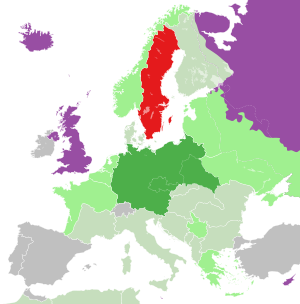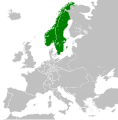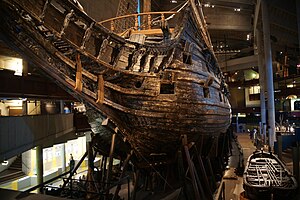Portal:Sweden
Welcome to the Sweden Portal! | |||||||||

|

|

| |
Sweden, formally the Kingdom of Sweden, is a Nordic country located on the Scandinavian Peninsula in Northern Europe. It borders Norway to the west and north, and Finland to the east. At 450,295 square kilometres (173,860 sq mi), Sweden is the largest Nordic country and the fifth-largest country in Europe. Its capital and largest city is Stockholm. Sweden has a population of 10.6 million, and a low population density of 25.5 inhabitants per square kilometre (66/sq mi); 88% of Swedes reside in urban areas. They are mostly in the central and southern half of the country. Sweden's urban areas together cover 1.5% of its land area. Sweden has a diverse climate owing to the length of the country, which ranges from 55°N to 69°N.
Sweden has been inhabited since prehistoric times, c. 12,000 BC. The inhabitants emerged as the Geats (Swedish: Götar) and Swedes (Svear), which together constituted the sea-faring peoples known as the Norsemen. A unified Swedish state was established during the late 10th century. In 1397, Sweden joined Norway and Denmark to form the Scandinavian Kalmar Union, which Sweden left in 1523. When Sweden became involved in the Thirty Years' War on the Protestant side, an expansion of its territories began, forming the Swedish Empire, which remained one of the great powers of Europe until the early 18th century. During this era Sweden controlled much of the Baltic Sea. Most of the conquered territories outside the Scandinavian Peninsula were lost during the 18th and 19th centuries. The eastern half of Sweden, present-day Finland, was lost to Imperial Russia in 1809. The last war in which Sweden was directly involved was in 1814, when Sweden by military means forced Norway into a personal union, a union which lasted until 1905.
Sweden is a highly developed country ranked fifth in the Human Development Index. It is a constitutional monarchy and a parliamentary democracy, with legislative power vested in the 349-member unicameral Riksdag. It is a unitary state, divided into 21 counties and 290 municipalities. Sweden maintains a Nordic social welfare system that provides universal health care and tertiary education for its citizens. It has the world's 14th highest GDP per capita and ranks very highly in quality of life, health, education, protection of civil liberties, economic competitiveness, income equality, gender equality and prosperity. Sweden joined the European Union on 1 January 1995 and NATO on 7 March 2024. It is also a member of the United Nations, the Schengen Area, the Council of Europe, the Nordic Council, the World Trade Organization and the Organisation for Economic Co-operation and Development (OECD). (Full article...)
John Fredrik Reinfeldt (pronounced [ˈfrěːdrɪk ˈrâjnːfɛlt] ; born 4 August 1965) is a Swedish economist, lecturer, former Prime Minister of Sweden from 2006 to 2014 and chairman of the liberal conservative Moderate Party from 2003 to 2015. He was the last rotating President of the European Council in 2009. He has been the chairman of the Swedish Football Association since 25 March 2023.
A native of Stockholm County, Reinfeldt joined the Moderate Youth League in 1983. By 1992 he rose to the rank of chairman, a position he held until 1995. He served as Member of Parliament from 1991 to 2014, representing his home constituency. Reinfeldt was elected party leader on 25 October 2003, succeeding Bo Lundgren. Under his leadership, the Moderate Party has transformed its policies and oriented itself closer to the political centre, branding itself "The New Moderates" (Swedish: Nya moderaterna). In 2010, under Reinfeldt's leadership, the Moderate Party got its highest share of the vote since the introduction of universal suffrage in 1921. (Full article...)
Selected article -

Sweden maintained its policy of neutrality during World War II. When the war began on 1 September 1939, the fate of Sweden was unclear. But by a combination of its geopolitical location in the Scandinavian Peninsula, realpolitik maneuvering during an unpredictable course of events, and a dedicated military build-up after 1942, Sweden kept its official neutrality status throughout the war. At the outbreak of hostilities, Sweden had held a neutral stance in international relations for more than a century, since the end of the Napoleonic Wars in 1814 and the invasion of Norway.
At the outbreak of war in September 1939, twenty European nations were neutral. Sweden was one of only nine of these nations to maintain this stance for the remainder of the war, along with Ireland, Portugal, Spain, Switzerland, and the microstates of Andorra, Liechtenstein, Vatican City, and San Marino. The Swedish Government made a few concessions, and sometimes breached the nation's neutrality in favor of both Germany and, later, the Western Allies. (Full article...)
Did you know -

- ... that Sweden was a major power in Europe during the 17th century?
- ... that the song "Gubben Noak" (Songs of Fredman no 35) offended the Swedish church so much that Lund chapter attempted to collect all prints and transcripts in circulation, in 1768?
- ... that Umeå, a 2014 European Capital of Culture, is near an arboretum that specializes in growing plants for use at northern latitudes?
General images -
Vasa or Wasa (Swedish pronunciation: [²vɑːsa] ) is a Swedish warship built between 1626 and 1628. The ship sank after sailing roughly 1,300 m (1,400 yd) into her maiden voyage on 10 August 1628. She fell into obscurity after most of her valuable bronze cannons were salvaged in the 17th century, until she was located again in the late 1950s in a busy shipping area in Stockholm harbor. The ship was salvaged with a largely intact hull in 1961. She was housed in a temporary museum called Wasavarvet ("The Vasa Shipyard") until 1988 and then moved permanently to the Vasa Museum in the Royal National City Park in Stockholm. As the most visited museum in Scandinavia, the ship is one of Sweden's most popular tourist attractions and has been seen by over 45 million visitors since 1961. Since her recovery, Vasa has become a widely recognized symbol of the Swedish Empire.
The ship was built on the orders of the King of Sweden Gustavus Adolphus as part of the military expansion he initiated in a war with Poland-Lithuania (1621–1629). She was constructed at the navy yard in Stockholm under a contract with private entrepreneurs in 1626–1627 and armed primarily with bronze cannons cast in Stockholm specifically for the ship. Richly decorated as a symbol of the king's ambitions for Sweden and himself, upon completion she was one of the most powerfully armed vessels in the world. However, Vasa was dangerously unstable, with too much weight in the upper structure of the hull. Despite this lack of stability, she was ordered to sea and sank only a few minutes after encountering a wind stronger than a breeze. (Full article...)
Categories
Main topics
Subdivisions: Counties of Sweden • Municipalities of Sweden • Provinces of Sweden

History: 1975 Occupation of the West German embassy • Ådalen shootings • Consolidation of Sweden • Early Swedish history • Enlightened Absolute Monarchy in Sweden • Early Vasa era • Industrialization of Sweden • Post-war Sweden • Prehistoric Sweden • Rise of Sweden as a Great Power • Suiones • Swedish Empire • Sweden after the Great Northern War • Sweden and the Winter War • Sweden during late 19th century • Sweden during World War II • Swedish allotment system • Swedish emigration to the United States • Union between Sweden and Norway
Politics: Alliance for Sweden • Constitution of Sweden • Foreign relations of Sweden • Government of Sweden • Parliament of Sweden • Riksdag • Swedish general election, 2006 • Swedish general election, 2010 • Swedish neutrality • Swedish welfare
Demographics: Education • Ethnic minorities • Languages • Religion • Subdivisions • Cities • People • Healthcare • Immigration
Culture: Cinema of Sweden • Cuisine of Sweden • Music of Sweden • Sports in Sweden • Swedish literature • Tourism in Sweden
Symbols: Flag • Coat of arms • National anthem
Things you can do
 |
Here are some tasks awaiting attention:
|
Wikipedia in Swedish
 |
There is a Swedish version of Wikipedia, the free encyclopedia. |
 |
WikiProjects
Featured and good content
Related portals
Northern Europe
Other countries











































